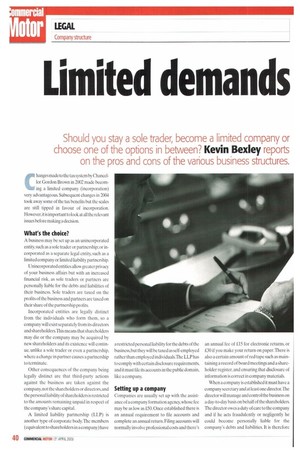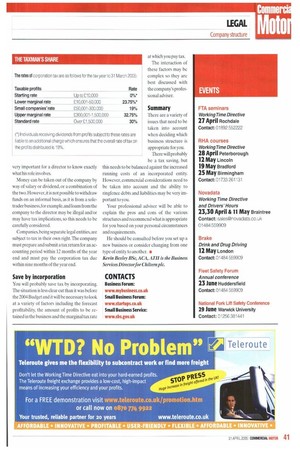Limited demands
Page 40

Page 41

If you've noticed an error in this article please click here to report it so we can fix it.
Should you stay a sole trader, become a limited company or
choose one of the options in between? Kevin Bexley reports
on the pros and cons of the various business structures.
Changes made to the tax system by Chancellor Gordon Brown in 2002 made becoming a limited company (incorporation) very advantageous. Subsequent changes in 2004 took away some of the tax benefits but the scales are still tipped in favour of incorporation. However, it is important to look at all the relevant issues before making a decision.
What's the choice?
A business may be set up as an unincorporated entity, such as a sole trader or partnership; or incorporated as a separate legal entity, such as a limited company or limited liability partnership.
Unincorporated entities allow greater privacy of your business affairs but with an increased financial risk, as sole traders or partners are personally liable for the debts and liabilities of their business. Sole traders are taxed on the profits of the business and partners are taxed on their share of the partnership profits.
Incorporated entities are legally distinct from the individuals who form them, so a company will exist separately from its directors and shareholders.This means that shareholders may die or the company may be acquired by new shareholders and its existence will continue, unlike a sole trader or even a partnership, where a change in partner causes a partnership to terminate.
Other consequences of the company being legally distinct are that third-party actions against the business are taken against the company, not the shareholders or directors, and the personal liability of shareholders is restricted to the amounts remaining unpaid in respect of the company's share capital.
A limited liability partnership (LLP) is another type of corporate body. The members (equivalent to shareholders in a company) have a restricted personal liability for the debts of the business, but they will be taxed as self-employed rather than employed individuals. The LLP has to comply with certain disclosure requirements, and it must file its accounts in the public domain, like a company.
Setting up a company
Companies are usually set up with the assistance of a company formation agency, whose fee may be as low as £50. Once established there is an annual requirement to file accounts and complete an annual return. Filing accounts will normally involve professional costs and there's an annual fee of £15 for electronic returns, or £30 if you make your return on paper. There is also a certain amount of red tape such as maintaining a record of board meetings and a shareholder register, and ensuring that disclosure of information is correct in company materials.
When a company is established it must have a company secretary and at least one director.The director will manage and control the business on a day-to-day basis on behalf of the shareholders The director owes a duty of care to the company and if he acts fraudulently or negligently he could become personally liable for the company's debts and liabilities. It is therefore very important for a director to know exactly what his role involves.
Money can be taken out of the company by way of salary or dividend, or a combination of the two. However, it is not possible to withdraw funds on an informal basis, as it is from a soletrader business,for example, and loans from the company to the director may be illegal and/or may have tax implications, so this needs to be carefully considered.
Companies, being separate legal entities, are subject to tax in their own right. The company must prepare and submit a tax return for an accounting period within 12 months of the year end and must pay the corporation tax due within nine months of the year end.
Save by incorporation
You will probably save tax by incorporating. The situation is less clear cut than it was before the 2004 Budget and it will be necessary to look at a variety of factors including the forecast profitability, the amount of profits to be retained in the business and the marginal tax rate at which you pay tax.
The interaction of these factors may be complex so they arc best discussed with the company's professional adviser.
Summary
There are a variety of issues that need to be taken into account when deciding which business structure is appropriate for you.
There will probably be a tax saving, but this needs to be balanced against the increased running costs of an incorporated entity. However, commercial considerations need to be taken into account and the ability to ringfence debts and liabilities may be very important to you.
Your professional adviser will be able to explain the pros and cons of the various structures and recommend what is appropriate for you based on your personal circumstances and requirements.
He should be consulted before you set up a new business or consider changing from one type of entity to another. • Kevin Bexley BSc, ACA, ATII is the Business Services Directorfor Chiltern plc.










































































































































































































